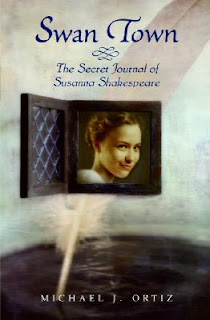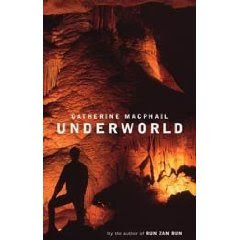I'm in this writing class and I had to do a research paper on some aspect of writing pertaining to the English department. Since my life this whole year has somehow become inexorably linked to both Shakespeare and young adult lit, I decided to write about... Shakespeare and young adult lit!! I actually tried to write this paper last semester, but something completely different somehow came out, so really this was just doing justice to a long-simmering idea.
For this paper I had to read fishloads of Shakespeare-based YA novels, which was... interesting. Honestly, if I had a million dollars I would set up a prize for the first person to retell a Shakespeare play without making it either ridiculously
pompous and self obsessed or ridiculously... ridiculous.
Okay so here are the categories of Shakespeare novelization, with the novels I read in each, and how lame or awesome they are:
1) Character novel. These are books that retell the play, straight up, but from the perspective of a character not necessarily typical. They usually focus on a character who doesn't have much power in the original (so, girls) so that they can wackily turn things around and have a completely new perspective on really well known stories. The only ones I could find were Ophelia based (which might explain why they are soooo annoooooying).

First, Ophelia, by Lisa Klein. This one had a lot going for it. First of all, the jacket art is gorgeous. That matters. Seriously. I would probably have disliked this book a billion times more if the cover had been gross or indifferent. Anyway. Okay so it starts with little baby Ophelia, and basically just goes um through the imagined like of Ophelia. I'll be honest, this is one that I read the first time I considered this topic, so it's been a while. As I recall the writing was nice, so that is more points in its favor. What I didn't like about it is that by the time I was about half way through I just gave up and started skimming, and I feel like having read maybe 1 sentence out of 10 for the later half of the novel I didn't really miss out on anything. The plot extends pretty far out from the end of Hamlet, because rule number one of Ophelia character novels is that Ophelia fakes her death and runs away to the continent. This one, like I said, was a bit annoying because honestly it just dragged on and on with her in some French convent learning all these life lessons, which I guess is good as just some book but I suppose was unexpected when I was looking for Shakespeare--so maybe this book would be better if you were just reading it as an interesting historical novel, which happens to have some Shakespeare names and plot bits in it. It is SO HARD not to say what happens in the end, because I find it delightfully silly, but I feel like I should refrain so that anyone who goes and reads it gets their unspoiled reward for making it through.

Second: Dating Hamlet, by Lisa Fiedler.
Okay so...I hardly know what to say. This is like writing a review of Waterworld. Objectively you know it's ridiculous, and so part of you hates it, but then the other part revels in the cheap thrills and lighthearted shuffling of everything Shakespeare ever wrote or thought about. Let's just say that Ophelia is a sassy modern woman, her REAL father is the cheeky gravedigger, she's a REALLY accomplished death-faker, and everyone lives happily ever after. Oh gosh. The horror/the delight. It's like a Hallmark channel movie. No, that's not quite it--if anything Ophelia was a Hallmark Channel movie, because it took itself so painfully seriously. Dating Hamlet is more ABC Family Channel, or even Disney Channel--it is garbage and it loves it.
Okay. Category Two: Fictionalized Biography
These are books that take place in Elizabethan England and "tell the story" of how the play/plays were written/inspired/acted. This category actually has two sub-ca
tegories, which I don't have special names for. The first is the kind of book were a young boy actor type goes and joins the acting troop and hangs out with ol' Will and Burbage and whatnot and has rollicking good times on stage and fighting off plague and whatnot. A lot of these books are actually really solid, such as...

King of Shadows, by Susan Cooper. I think that was actually the first book I reviewed up in here, so I guess I don't have to explain it all again. Suffice it to say, Cooper actually creates real emotion, likable characters, and really it's just a sweet book all around. High five.

There is also an entire series starting with The Shakespeare Stealer by Gary Blackwood. I actually only read the second one in the sequence, called Shakespeare's Scribe. I actually read an article by Blackwood and used it a bit in writing my paper, so I feel like we're old chums. The story was pretty simple; there's some poor Yorkshire lad who I suppose in book one joined the troop and had some stealing shenanigans, but by book 2 everything's cool, except the plague has s
truck London so they have to tour the countryside to earn their living. The article I read was about trying to approximate Elizabethan English while still being comprehensible to modern audiences, and looking back it's true--Blackwood spends a lot of time making his dialogue sound period appropriate, without making it too noticeable or jarring to the reader. These books are for a slightly younger audience than the Ophelia books (oh yeah I should note, there was definitely a hint of raciness in the Ophelia novels, although I don't think there was anything too overt or inappropriate... but don't quote me on it)--so the stories and themes are simple, but they're still rather nice.
Part 2 of this category is comprised of books about Shakespeare's daughter Susanna. It's actually kind of funny; I have no idea why this is even a thing, but apparently people think it's cool to write about old Susanna Shakespeare. I guess it's because it's a good way to get the girl-power angle into an otherwise pretty boy-oriented time period.

Anyway, I only read one of these: Swan Town, by Michael Ortiz. I can't really say I loved it. I get annoyed when people get locked into the whole "Uh-oh I want to write this novel for modern audiences but that requires a modern heroine so I'd better modernize this historical figure real quick, let's see, she is frustrated with the restrictions of her time period and secretly wants a life of writing and playing JUST LIKE DAD" debacle. I mean, I get it, I get why they do it, that makes all kinds of sense... but um still I just don't get into it. It jsut seems like once you go down that road there is only one way for it to go--
--But I want to do this literary type thing that is inappropriate for a woman to do in this time period!
--TOO BAD we will MARRY YOU OFF or something, get back in your hole!
--But MOOOOOOM
--I MEAN IT
--Okay I guess I will just go behind your back and express myself and be FREE
--Hey idiot child remember how there are social norms and LAWS and LACKS OF BASIC FREEDOMS in this time period and so now we are all screwed because of you?
--Oh um right
--Well okay don't worry somehow we will just retreat into a quieter life and...trail off into somehow reconciling your unique world view with the clearly opposing world view of the society which has been created in this novel.
Well that is what I call getting carried away. Will this post ever end? NOPE. We haven't even gotten around to...
Category Three: Retellings in Modern Context!! Woo!!

These books can go all kinds of ways. I kind of like this genre just because it seems like the wackiest, and a place where the wackiness is more legitimate than others, because it's not like you're pretending to be honestly retelling a play and you're certainly not pretending to be at all historically based--you're just talking about some kid in Australia who freaks out when his parents get divorced, and if all your character names happen to have a vague similarity to Hamlet-type analogues, that is just how it goes. And that is a little something I like to call Joker, by Ranulfo. Yes. One name. That is why I checked out the book, no lie.

My absolute FAVORITE book in this genre is The Wednesday Wars by Gary Schmidt. It's about a kid in middle school in the 70s, and he is assigned to read some Shakespeare plays outside of class sort of, and the whole book is just about this year in school and all the great awesome things that happen and how the couple plays he reads sort of correspond. I think the real reason I love it is because even though there are problems and jerks and hard things associated with teenagerdom, this book also has nice things and really great people and shows them figuring out and getting over the crappy stuff and sticking up for each other and being decent. Which is nice, because we all need to be reminded that all the good stuff can exist when we get bogged down in the crappiness, yeah?
ANYdangWAY, there is my dissertation on the state of current Shakespeare Adaptations for Young Adults. There are approximately a billion more novels out there, these are just my favorites/ones I read most recently/the once I already got cover art for to use in my class presentation. Ahem.
































